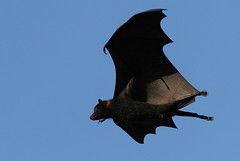Ten people cleared of Hendra virus

Ten people have been cleared of the preliminary blood tests of the potentially fatal Hendra virus following contact with an infected horse on Queensland's Sunshine Coast.
However, health authorities are still awaiting the results for an eleventh person who also had contact with the horse at Tewantin before travelling interstate.
All eleven will face ongoing tests - the infected horse was put down last week.
Senior director of Queensland Health Communicable Diseases branch Dr Christine Selvey said on Monday that further testing still needs to be carried out at 21 days and again at 42 days after exposure to the infected horse before the 11 people can be cleared to go home.
Bats are known to carry the Hendra virus and pass it to horses through bodily fluids. Horses, in turn, can pass it to humans.
Symptoms of the disease in humans generally appear five to 21 days after exposure to the virus.
Premier Anna Bligh has defended the delay in funding for a new trial of the Hendra virus vaccine, but says she understands the frustrations of people who had lost loved ones to the virus.
Queensland Primary Industries Minister Tim Mulherin on Monday said the state and federal governments would each provide $300,000 to trial the vaccine on horses.
The Australian Veterinary Association said the trial of the vaccine, being developed by the CSIRO's Australian Animal Health Laboratory, would allay a lot of angst among vets and horse owners.
This is a very significant public health issue for people in the horse industry and it's very pleasing this vital research will be able to go ahead, the association's vice president Dr Barry Smyth said.
Queensland Horse Council President Debbie Dekker said the funding was a very welcome step, but urged horse owners to remain vigilant against the disease and take precautions.
There have been 14 Hendra outbreaks in Australia since 1994, killing more than 40 horses, and causing four human deaths. All of the human deaths have occurred in Queensland.
Owners and handlers have been advised to keep horses away from bat colonies and immediately report to authorities any flu-like symptoms in their animals.
Vets and others dealing with sick horses are strongly urged to wear protective gear.
jm





















